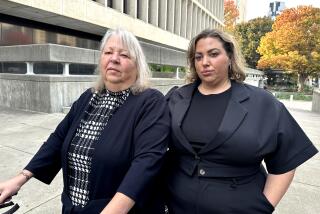High Court Lets AIDS Patient Continue Privacy Invasion Suit
- Share via
SAN FRANCISCO — The state Supreme Court has refused to throw out an invasion of privacy countersuit by a surgery patient who was sued by her nurse for failing to reveal that her blood was infected with the AIDS virus.
With two justices dissenting, the court declined to hear contentions by the nurse that the patient’s countersuit violated the constitutional right to openly discuss litigation in public.
The case began when nurse Diane Boulais brought suit in Los Angeles Superior Court against patient Jan Lustig, charging Lustig fraudulently concealed the fact she had tested positive for the virus. Boulais said that her finger was nicked by a scalpel during cosmetic breast surgery on Lustig, exposing Boulais to the patient’s blood.
Boulais’ suit was announced at a news conference last fall and described by her attorneys as the first of its kind filed by a health care worker against a patient with the AIDS virus.
Lustig, a psychologist and AIDS counselor, then brought her countersuit against Boulais and her lawyers, saying the nurse’s suit was “malicious” and represented an invasion of privacy and intentional infliction of emotional distress. Lustig should have been identified only as “Jane Doe” in the suit, she said.
Attorneys for Boulais asked the state high court to order dismissal of Lustig’s suit, saying the law gave absolute protection to litigants to identify defendants by name and discuss the case with the press.
Allowing the Lustig suit to proceed, Boulais’ lawyers said, could “effectively make it impossible for litigants and their counsel to file, announce or discuss significant litigation regarding issues of compelling national significance.”
The high court refused to review the case in a brief order filed Wednesday. Justices Edward A. Panelli and Armand Arabian voted to hear the issue, two votes short of the number required for review by the seven-member court.
More to Read
Get the L.A. Times Politics newsletter
Deeply reported insights into legislation, politics and policy from Sacramento, Washington and beyond. In your inbox twice per week.
You may occasionally receive promotional content from the Los Angeles Times.










